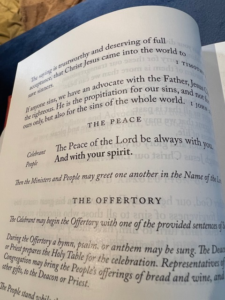 Every now and then during church, Brent does something that makes me so uncomfortable that I try not to glance around nervously to see how other people are taking it. (Generally speaking, spouses try not to swivel their heads around to see how things are going…) I’m not referring to his jokes, because usually I’m the loudest laugher, which is just a sweet little thing in our marriage. I find him funny.
Every now and then during church, Brent does something that makes me so uncomfortable that I try not to glance around nervously to see how other people are taking it. (Generally speaking, spouses try not to swivel their heads around to see how things are going…) I’m not referring to his jokes, because usually I’m the loudest laugher, which is just a sweet little thing in our marriage. I find him funny.
I’m referring to his practice of saying things out loud that we’d prefer kept quiet: that everyone sitting in church that day might have big and ongoing disagreements with others, and that the fracture lines in our relationships are likely deepening and in need of repair. And that there is something we can and should do about this.
It happens just before communion, when the officiant (the priest leading communion) says: The Peace of the Lord be always with you. And the people (the rest of us) say: And with your spirit, or sometimes, And also with you.
Brent might break out of the liturgy then, for just a second, and say something like: “If there’s someone you need to call and make peace with, why don’t you take your phone and go out and call them right now?” Or, even worse: “If there’s someone in the church that you need to apologize to, why don’t you go do that right now.”
You can see the potential for awkwardness.
Next in the service, we turn to each other to pass that peace. We shake each other’s hands (when there’s not a wretched pandemic, of course) and say something like, “The peace of Christ be with you,” right to each other’s faces. This gripping of hands, and meeting of eyes, is ancient and beautiful and part of how we are to be reconciled with each other. It is a spiritual act that brings us face-to-face, and in better, brighter days, hand-to-hand with each other. I love it. (Currently, we are waving to each other instead, like little kids strapped into strollers).
Once, when we attended church in Honduras, during the passing of the peace, a dance broke out. It was a joyful, loud peace-passing party, practically a conga line. I will never forget it. This is how it should be done.
My faith — along with several Brené Brown podcasts — have taught me how to say I’m sorry. And my faith has taught me that very often, I need to.
It is better to pass the peace than hold the grudge. The offering and receiving of forgiveness is as counter-cultural right now as it has ever been.
But it is hard and necessary work. It can be awkward and painful, and it may not go well. People might not swoon at the sight of your outstretched hand. But you will have done your part, which will be good also for your own heart, even if it doesn’t thaw the heart of another, at least right away. So, if there’s someone you need to call and make peace with, why don’t you take your phone and go out and call them right now?
